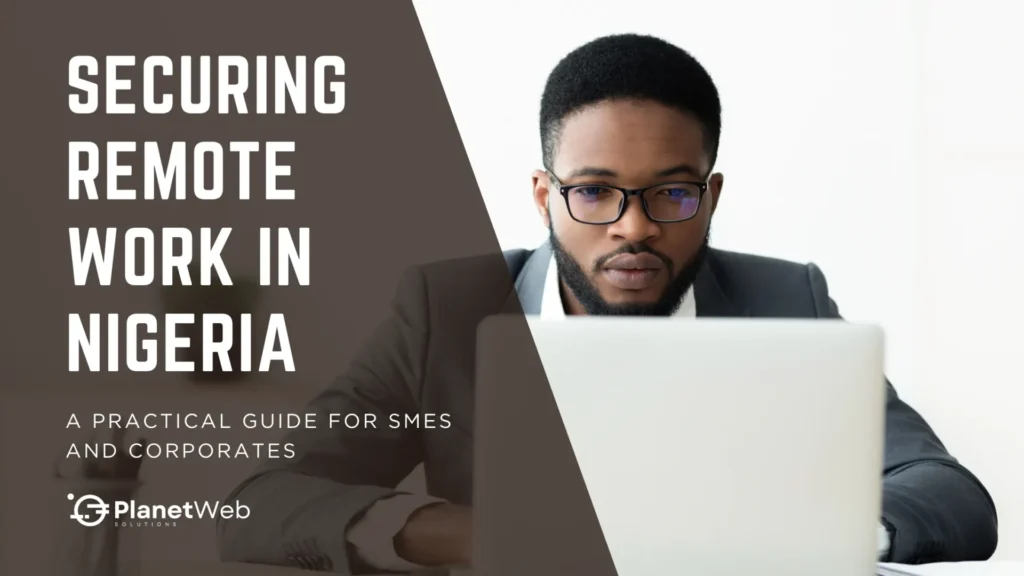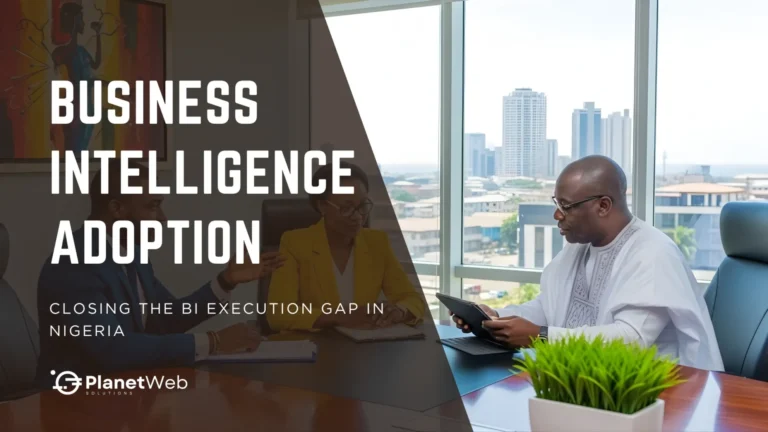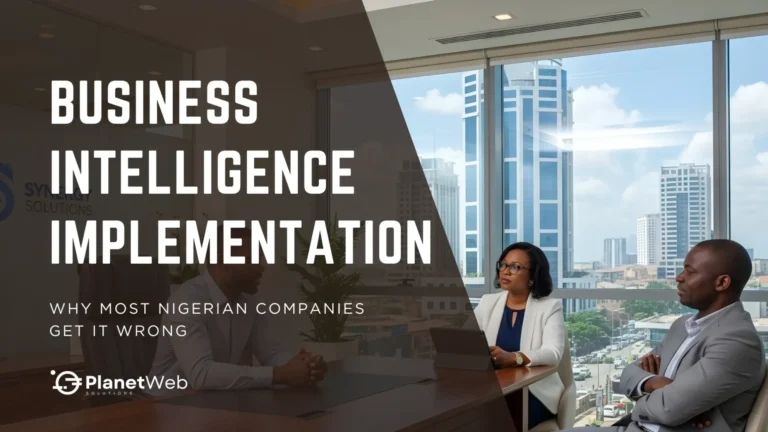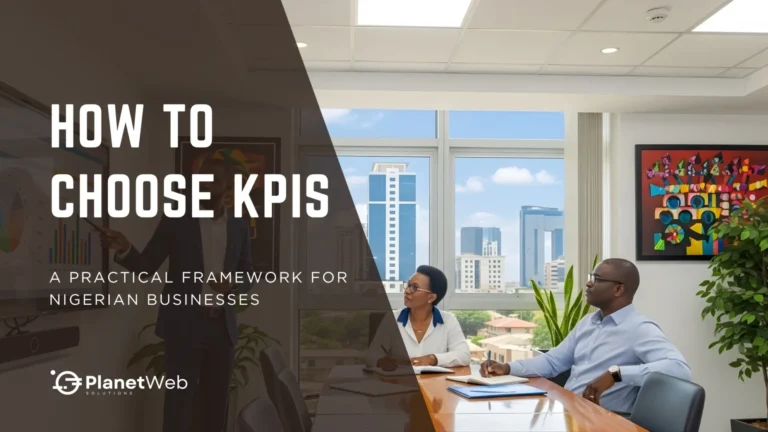Securing Remote Work in Nigeria: A Practical Guide for SMEs and Corporates
Securing remote work in Nigeria has become a critical priority for businesses of all sizes. Remote and hybrid work are now part of everyday business operations in Nigeria. SMEs and corporates alike rely on distributed teams to get work done. For many businesses, the shift happened fast during the pandemic and never reversed. Employees work from home, coworking spaces, or wherever they can get decent internet. It’s become normal.
This flexibility improves productivity and cuts overhead costs. Many businesses are glad to reduce the overhead of expensive office space in Lekki or Victoria Island. But it also creates new cyber risks that many Nigerian businesses aren’t prepared for.
Nigeria is one of Africa’s top targets for phishing and ransomware attacks. According to the Nigerian Communications Commission (NCC), phishing attempts and ransomware incidents have risen significantly in recent years, with SMEs increasingly targeted. Cybercriminals know that many SMEs lack formal IT structures, making them easier targets than large enterprises with dedicated security teams. And here’s the hard truth: with the Nigeria Data Protection Act (NDPA) 2023 now in force, businesses have a legal duty to protect employee and client data. You remain liable even if breaches happen through freelancers or contractors working on your behalf.
This guide lays out practical, Nigeria-focused best practices for securing remote work in Nigeria. We’ll also touch on what you should expect from the freelancers and contractors you work with, since they’re part of your wider remote ecosystem.
Why Securing Remote Work in Nigeria Matters for Businesses
Cybercriminals increasingly target SMEs, not just large corporations. The assumption that “we’re too small to be targeted” is dangerous. Attackers look for easy wins, and a business without basic security measures is an easy win.
Under NDPA 2023, your business has a legal duty to protect data, regardless of where or how employees access it. This isn’t just about avoiding fines. It’s about maintaining client trust and business continuity. For a deeper dive into compliance, see our guide on data protection compliance strategies in Nigeria.
Here’s a real example: A Lagos marketing agency lost a major client after malware infected a staff member’s personal laptop. The employee was working from home when the attack happened. Sensitive client strategy documents leaked. The client found out, terminated the contract immediately, and posted a warning in their industry network. The agency lost an estimated ₦2.5 million in annual revenue and spent six months repairing its reputation. Some of their other clients started asking uncomfortable questions about security practices. Their experience is a reminder that in Nigeria’s competitive market, one data leak can cost both clients and reputation in a single night. You can explore more Nigerian data breach case studies to see how other businesses have been affected.
The risks are real: financial loss, reputational damage, and potential regulatory penalties. But the good news is that most of these risks are manageable with the right practices in place.
Best Practices for Securing Remote Work in Nigeria
Not every business needs enterprise-grade security infrastructure. A three-person startup in Ibadan has different needs than a 50-person fintech in Lagos. What matters is having security measures that match your current reality and grow as you do.
Here’s a tiered approach that works for Nigerian businesses at different stages.
Essential: Baseline Every Nigerian Business Should Achieve
These are non-negotiables. If you’re not doing these things yet, start here.
Enforce strong, unique passwords. Many Nigerian businesses still reuse “Admin123” or share one password across all their social media accounts. This is asking for trouble. Require employees to use unique passwords for each system. A password manager like Bitwarden or LastPass makes this easier. See the UK National Cyber Security Centre password guidance for more best practices.
Require Multi-Factor Authentication (MFA) on all company systems. MFA adds a second step to login, usually a code sent to your phone. Even if someone steals a password, they can’t get in without that second factor. Enable it on email, cloud storage, financial systems, and any platform that handles business or client data. Learn more about MFA from Google’s authentication guide.
Use secure cloud storage. Stop sending sensitive files through WhatsApp or storing them on personal devices. Use platforms like Zoho Workplace, Microsoft 365, or Google Workspace. These services encrypt your data and make it easier to control who has access. Zoho Workplace is particularly good for Nigerian businesses because it combines secure file storage, email, and collaboration tools in one affordable platform that works well with local internet infrastructure. See our guide on remote work with Zoho Workplace in Nigeria for more insights.
Regularly update software and devices. Those update notifications that are often ignored? They often contain security patches for newly discovered vulnerabilities. Make it company policy to install updates promptly.
Intermediate: For SMEs with Growing Teams
Once you’ve covered the basics, these practices help you scale securely.
Provide affordable VPN access for employees. A VPN encrypts your internet traffic and protects data when employees are working from home or public spaces. Options like ProtonVPN, NordVPN, or Cloudflare WARP work well with Nigerian ISPs and won’t break the bank. Make VPN use mandatory for accessing company systems remotely.
Conduct simple phishing awareness exercises. Phishing emails that trick people into clicking malicious links or sharing passwords are still one of the most common attack methods. Send a test email that looks like it’s from a bank or delivery service and see who clicks. Then immediately follow up with a short training session for anyone who did. If you need a starting point, try the Google Phishing Quiz, which is free and only takes five minutes, or the KnowBe4 free phishing security test. Your IT partner can also create basic simulations tailored to common Nigerian scam tactics. Learn more about insider threats in Nigeria that often result from poor awareness.
Set clear device policies. Define whether staff can use personal laptops or must use company-provided devices. If personal devices are allowed, establish minimum security requirements like antivirus software, screen locks, and automatic updates. Put this in writing so everyone knows the expectations.
Ensure regular backups of business-critical data. If ransomware hits or a laptop gets stolen, backups are your safety net. Use automated cloud backups for important files and test them periodically to make sure they actually work. A secure tool like Zoho WorkDrive for Nigerian SMEs can be part of your backup and collaboration strategy.
Advanced: For High-Risk Industries or Larger Teams
If you handle sensitive customer data or operate in regulated sectors like finance, healthcare, or oil and gas, you need more robust security. Under NDPA 2023, businesses processing sensitive personal data (financial records, health information, biometric data) are held to stricter standards and face higher penalties for breaches. This tier is about meeting those requirements. For an in-depth guide, see our article on navigating the Nigeria Data Protection Act 2023.
Implement a Zero-Trust security model. Zero-trust means “never trust, always verify.” Every login and device gets verified, even if it’s a known employee on a recognized device. This approach assumes that threats can come from anywhere, including inside your network.
Deploy Mobile Device Management (MDM) tools. MDM lets you manage and secure all the laptops and smartphones accessing your systems. You can enforce security policies, remotely wipe devices if they’re lost or stolen, and ensure company data stays protected.
Run regular access audits. Check quarterly who has access to what. People change roles, contractors finish projects, but their access often remains. Remove unnecessary permissions and ensure everyone follows the principle of least privilege: they only have access to what they actually need.
Align policies with NDPA 2023 and sector regulations. Document your security practices, maintain audit trails, and ensure you can demonstrate compliance if regulators come asking. If you don’t have in-house expertise, work with an IT partner who understands Nigerian compliance requirements.
What to Expect from Freelancers and Contractors in Securing Remote Work in Nigeria
Freelancers and contractors are often deeply embedded in Nigerian business operations. They handle design work, marketing campaigns, software development, content creation, and IT support. They’re valuable partners, but they can also become security weak points if not properly managed.
Here’s what many business owners don’t realize: under NDPA 2023, your business remains liable for data breaches even if they were caused by a contractor. You can’t outsource your legal responsibility for protecting data. This means you need to set clear security expectations and verify that freelancers meet them. See also: Nigeria Data Protection Act for Businesses.
Sample Security Clauses for Contractor Agreements
Don’t assume freelancers know what you expect. Put it in the contract. Here are clauses you can adapt:
- “Contractor must enable Multi-Factor Authentication on all shared accounts and platforms.”
- “All client data must be stored on encrypted, password-protected platforms. No storage on personal devices or USB drives.”
- “Contractor must report suspected security incidents within 24 hours.”
- “Upon project completion, the contractor must delete all client files and confirm deletion in writing.”
These clauses protect you legally and set clear expectations from the start.
Practical Enforcement Tips
Explain your security requirements during onboarding. Don’t wait until a project is halfway done to bring up security expectations. Cover them in your initial brief or RFP.
Ask freelancers to confirm compliance in writing. A simple email saying “I confirm I’m using MFA and secure file storage as required” creates accountability.
Provide access only to the systems they truly need. Don’t give a graphic designer access to your financial records just because it’s easier than managing permissions properly. Follow the principle of least privilege with contractors just like you do with employees.
If you’re working with freelancers who resist security requirements, it’s often because they’re juggling multiple clients with different standards. Make your requirements clear upfront, and most professional freelancers will appreciate the clarity.
Remote Work Security Checklist for Nigerian Businesses
Use this checklist to assess where you stand and what needs attention. Ensure both employees and contractors meet these standards.
Access and Authentication:
- Enforce strong passwords and MFA on all accounts
- Audit access rights quarterly
- Require VPN use for remote connections
Data Protection:
- Use secure cloud storage for company data
- Back up critical data regularly and test restores
- Document security policies and incident response procedures
Training and Awareness:
- Train staff on phishing risks and run simulated exercises
- Keep all software and devices updated
Contractor Management:
- Include security clauses in freelancer and contractor agreements
- Ensure contractor compliance with security standards
Continuous Improvement:
- Review and update security practices as your business grows
Moving Forward
Securing remote work in Nigeria is here to stay. The flexibility it offers is too valuable for both businesses and employees. However, weak security can erase all those benefits in a matter of hours.
Businesses that build strong security practices reduce risk, stay compliant with NDPA 2023, and win client trust. When clients see that you take data protection seriously, it becomes a competitive advantage. Contractors who align with these standards become safer and more valuable partners, thereby strengthening the entire ecosystem.
Security isn’t just an IT issue. It’s essential for business continuity and reputation in Nigeria’s growing digital economy. Start with the essentials, build up as you grow, and make security part of your business culture rather than an afterthought.
The good news is that you don’t need to implement everything at once. Pick the tier that matches your current stage, focus on those practices first, and build from there. Your future self will thank you.
Looking for more guidance on securing your business? The PlanetWeb blog offers in-depth resources on NDPA compliance, data protection strategies, cybersecurity for Nigerian SMEs, and building resilient remote teams. We publish practical guides that help you navigate Nigeria’s evolving digital landscape. Explore our resources or subscribe to stay updated on the latest best practices.






